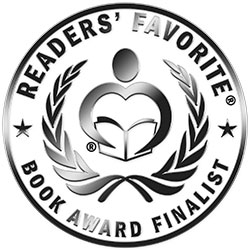![]() This author participates in the Readers' Favorite Book Donation Program, which was created to help nonprofit and charitable organizations (schools, libraries, convalescent homes, soldier donation programs, etc.) by providing them with free books and to help authors garner more exposure for their work. This author is willing to donate free copies of their book in exchange for reviews (if circumstances allow) and the knowledge that their book is being read and enjoyed. To begin, click the purple email icon to send this author a private email. Be sure to tell the author who you are, what organization you are with, how many books you need, how they will be used, and the number of reviews, if any, you would be able to provide.
This author participates in the Readers' Favorite Book Donation Program, which was created to help nonprofit and charitable organizations (schools, libraries, convalescent homes, soldier donation programs, etc.) by providing them with free books and to help authors garner more exposure for their work. This author is willing to donate free copies of their book in exchange for reviews (if circumstances allow) and the knowledge that their book is being read and enjoyed. To begin, click the purple email icon to send this author a private email. Be sure to tell the author who you are, what organization you are with, how many books you need, how they will be used, and the number of reviews, if any, you would be able to provide.

Reviewed by Courtnee Turner Hoyle for Readers' Favorite
In FiNDing Hope: The Mind-Body Connection and the Importance of Being Seen and Heard, Jocelyn Bystrom offers readers a detailed account of her journey through traumatic events, the onset of health concerns and seizures, and the search for a proper diagnosis. Readers learn about Bystrom's symptoms, and the diagnoses doctors considered, like epilepsy and Parkinson's disease, as she shares her family's challenges and her time as an educator. Bystrom conveys her childhood and changing roles in her adulthood while she dealt with the effects of her symptoms and the pandemic. The author took notes and journaled her health and appointments with healthcare professionals, so she could chronicle EEGs, spinal taps, and seizures with accuracy. Bystrom includes her prayers as she struggled to find the source of her symptoms for seven years.
Jocelyn Bystrom relates her story as if the reader is a dear friend as she advocates awareness for Functional Neurological Disorder (FND). With literary skill, she recounts her intense emotions during each defining event. In addition to her debilitating symptoms, Bystrom details losing her mother to dementia. Even though her husband and children were a strong support group, the author acutely felt the absence of parental affection and longed for it. Bystrom's experience should issue a call to action, and more healthcare professionals should understand the need to treat the mind and body as one unit instead of separately. Bystrom is an inspiration to people who struggle with the uncertainty of their symptoms and hope for a definitive diagnosis. FiNDing Hope is a good selection for anyone looking for validation who has been told "let's wait and see" by medical professionals as they wonder about the origin and progression of their symptoms.